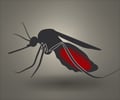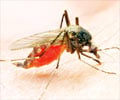Essential tea plant oil revealed antimalarial properties against two strains of Plasmodium falciparum, a malaria-causing parasite.

Chemical Composition and Antiplasmodial Activity of the Essential Oil of Rhododendron subarcticum Leaves from Nunavik, Québec, Canada
Go to source). “Labrador tea” refers to multiple, closely related plants — all members of the genus Rhododendron. These are small, evergreen shrubs with fuzzy leaves that, as their name suggests, are steeped to make herbal teas commonly used by the Inuit and Indigenous nations in the U.S. and Canada. Reportedly, drinks made from the leaves or roots can aid in treating colds or the flu, headaches or stomach aches, nasal congestion and many other ailments.
What Are the Benefits of a Traditional Medicine Plant for Drug-Resistant Malaria?
Past studies have shown that essential oils extracted from the plants have antimicrobial properties, which could help fight antibiotic-resistant microbes. Dwarf Labrador tea, or Rhododendron subarcticum, produces a particularly aromatic brew and grows in the harsher conditions of the subarctic, found from Alaska to Siberia just south of the Arctic Circle. Despite its common use as a traditional medicine, its chemical composition and potential antimicrobial applications remain relatively unstudied. So, Normand Voyer and colleagues wanted to characterize the makeup of R. subarcticum for the first time and test its antiparasitic activity.‘Ascaridole derived from tea plant showed anti-malarial activity against both strains of the malarial parasite.’





The team gathered R. subarcticum leaves from Nunavik, a region in northern Quebec. The researchers extracted the essential oil from the leaves and analyzed it with gas chromatography, mass spectrometry and flame ionization detection, to identify 53 compounds. It turns out that 64.7% of the oil was comprised of ascaridole, followed by p-cymene at 21.1%. This combination of compounds has not previously been reported in closely related North American Labrador tea varieties, though it has been found in subspecies originating in Europe and Asia. The researchers say that this work bolsters the importance of investigating and protecting plants used in traditional medicines, especially those from harsher climates impacted by climate change.
Reference:
- Chemical Composition and Antiplasmodial Activity of the Essential Oil of Rhododendron subarcticum Leaves from Nunavik, Québec, Canada - (https://pubs.acs.org/doi/10.1021/acsomega.3c00235)













